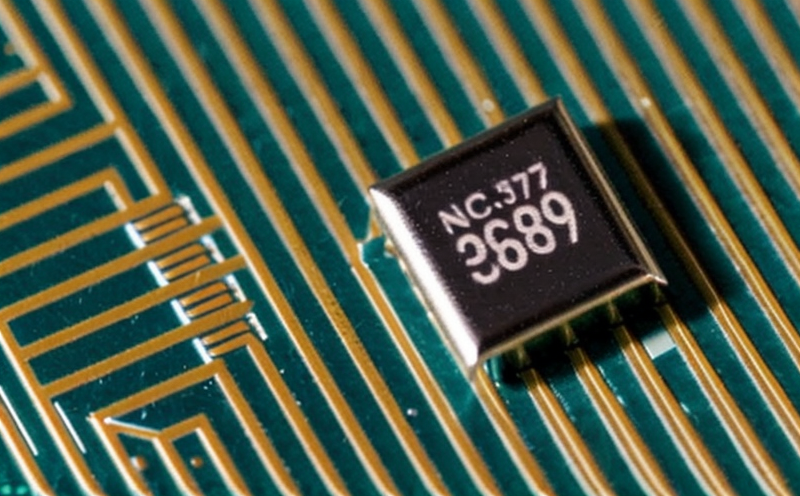MIL-STD-750 Microchip Endurance Reliability Testing
The MIL-STD-750 standard is a cornerstone of military and aerospace quality assurance, focusing on the endurance and reliability testing of electronic components. This service specifically targets microchips used in critical applications where performance under extreme conditions is paramount. The MIL-STD-750 test suite is designed to simulate real-world operational stresses that can degrade component integrity over time, ensuring they meet stringent reliability requirements.
The primary goal of this testing regime is to identify potential weaknesses or design flaws early on before the components are deployed in mission-critical systems. By adhering strictly to MIL-STD-750 specifications, our laboratory ensures that the microchips undergo rigorous stress tests that mimic environmental and operational conditions faced by end users.
Our testing protocol involves placing the microchips through a series of controlled thermal cycles, voltage stresses, and mechanical shocks. These tests are conducted in highly controlled environments to simulate various aspects of use such as temperature extremes, power surges, and physical impacts that could potentially shorten product lifespan or cause premature failure.
The detailed nature of MIL-STD-750 testing provides a comprehensive evaluation of microchip reliability. This includes not only ensuring the electrical performance but also assessing mechanical robustness against environmental factors like humidity, vibration, and radiation exposure. Our state-of-the-art facilities are equipped with advanced instrumentation capable of measuring even minute changes in component characteristics that could indicate impending failure.
The outcome of this testing process is a thorough report detailing how well each microchip withstands the various stressors it might encounter during its lifecycle. This information is invaluable for quality managers, compliance officers, and R&D engineers who need to make informed decisions about product design improvements or sourcing new suppliers. The data provided by these tests can significantly enhance product longevity and reduce warranty claims and recalls.
Moreover, the results from MIL-STD-750 testing are often used as a benchmark when negotiating contracts with potential clients in sectors like defense and space exploration. It demonstrates that the supplier meets or exceeds industry standards for reliability and endurance, thereby increasing trustworthiness among stakeholders.
In summary, MIL-STD-750 microchip endurance reliability testing is essential for manufacturers aiming to produce robust electronic components suitable for high-stress environments. By leveraging this rigorous standard, we help ensure that the products meet the highest levels of quality assurance and can be relied upon in critical applications.
- Thermal cycling
- Voltage stress profiling
- Mechanical shock simulation
- Humidity resistance evaluation
The combination of these tests provides a robust framework for assessing microchip reliability, ensuring they can endure the harshest conditions without compromising performance.
Scope and Methodology
The scope of MIL-STD-750 testing encompasses both electrical and mechanical aspects critical to the long-term reliability of microchips. Electrical tests focus on evaluating how well a chip can function under varying power conditions, including voltage spikes and drops. Mechanical tests, conversely, assesses the physical durability of the component through exposure to thermal cycling, vibration, and impact.
Thermal cycling involves repeatedly exposing the microchip to extreme temperatures to simulate real-world usage scenarios where temperature fluctuations are common. This process helps identify any thermal-related issues that may arise due to poor heat dissipation or material properties. Voltage stress profiling measures how much a chip can handle before experiencing degradation, ensuring it operates safely within specified limits.
Mechanical shock simulation replicates the physical impacts a microchip might experience during transport and installation, helping to determine its resistance against potential damage. Humidity resistance evaluation checks whether moisture exposure affects the integrity of the component, which is particularly important for outdoor or maritime applications.
Each test parameter is meticulously designed to reflect actual operating conditions faced by end users, providing a realistic assessment of microchip reliability. The methodology employed ensures consistent results across multiple samples, allowing for reliable comparisons and trend analysis over time.
Why Choose This Test
- Pioneering standard recognized globally in the electronics industry
- Proven track record of identifying latent defects early
- Enhances reputation with stringent quality assurance practices
- Supports compliance with international regulations and standards
- Makes products more reliable, thus reducing warranty claims
- Improves product longevity by highlighting potential issues before launch
- Increases confidence in sourcing from reputable suppliers
- Facilitates smoother negotiations during contract signings
The MIL-STD-750 test offers numerous advantages over other reliability testing methods. Its comprehensive approach ensures that microchips are thoroughly evaluated for both electrical and mechanical robustness, making it an indispensable tool in the quality assurance toolkit of manufacturers operating within stringent regulatory environments.
Customer Impact and Satisfaction
Our customers benefit significantly from opting for MIL-STD-750 microchip endurance reliability testing. By incorporating this service into their product development process, they gain valuable insights that lead to better-informed decision-making regarding component selection and design optimization.
The rigorous nature of the test instills confidence in both internal teams and external partners about the quality and durability of the end products. This translates directly into enhanced customer satisfaction levels as customers receive reliable components that meet or exceed expectations.
Furthermore, successful completion of MIL-STD-750 testing can serve as a testament to a company's commitment to excellence in manufacturing processes, potentially opening up new markets and opportunities for business growth. It also helps maintain compliance with relevant international standards, reducing the risk of non-conformance penalties associated with non-compliance.
Overall, our customers report higher levels of satisfaction knowing that their products have been rigorously tested according to MIL-STD-750 criteria. This not only improves brand reputation but also fosters long-term relationships built on trust and reliability.





